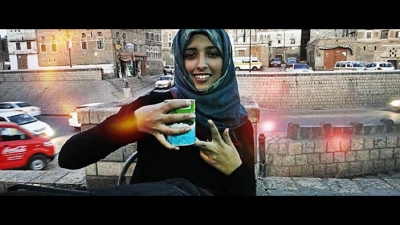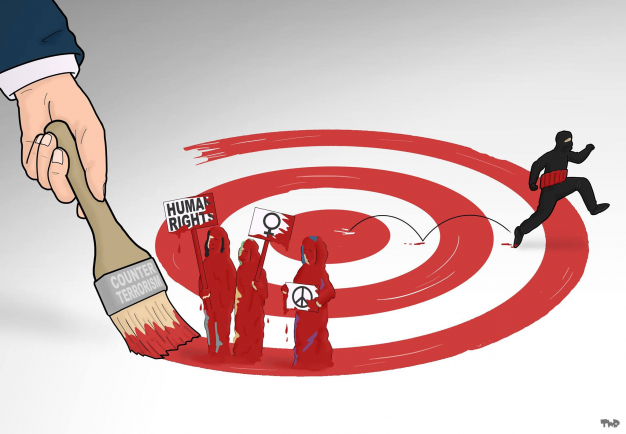Column by Wameedh Shakir
 "War is the most absurd thing happening in life, so we must help people to get out of this nonsense safe." said Hadeel al-Mowafaq, a young female Yemeni activist and member of a team monitoring and documenting human rights violations by Mwatana Organization for Human Rights.
"War is the most absurd thing happening in life, so we must help people to get out of this nonsense safe." said Hadeel al-Mowafaq, a young female Yemeni activist and member of a team monitoring and documenting human rights violations by Mwatana Organization for Human Rights.
May 9, 2015 was Hadeel's 20th birthday, and also the 15th day of war in Yemen, led by the Saudi-Arab coalition targeting the Houthi movement with daily airstrikes. Unlike other young people her age, Hadeel did not spend this day celebrating. But instead she traveled to Sa'wan, a poor neighborhood in Sana’a that was hit by the airstrikes on April 30, to collect information about human rights violations. The attack had killed 17 civilians according to eyewitnesses. When I asked her why this poor neighborhood was targeted, she replied: "Probably by mistake!"
Already when Hadeel was 14 years old, she collected information on human rights violations in regards to IDP children, being part of the Democracy School, an organization in Sana’a. Back then, Hadeel shared, she did not quite understand the importance and purpose of that kind of work. She just had many questions about why those children were living in camps, far away from their homes in Sa'ada, why this war was going on, and what in the end made it stop. But getting involved in the youth movement of the peaceful revolution in Yemen in 2011, provided her with many answers, she says. When Hadeel was camping for 10 months in the 'Change Square' in Sana'a during the revolution, together with many of her peers, protesting for former President Ali Abdullah Saleh to step down, the regime to be reset and a new civil state of equal citizenship to be built, she learned a lot about power dynamics. She learned that a small group of political elites managed to keep their power by creating conflict and war and by oppressing any peaceful and civil attempt for change. She said she finally understood the absurdities of violent conflict, which is benefiting a few and leaving the rest suffer.
From 2011 to 2015, Hadeel witnessed several violent conflicts breaking out in Yemen, and right now is living with the rest of the country through the hardest civil war Yemen has ever seen. A war, that divides Yemenis along geographic and ideological lines. A war, that abolishes houses, roads, camps and stores, depriving people of food, water, electricity and medicine, and above all, kills innocent children, women and men “by mistake”. Well, this is the craziness of war, Hadeel has noticed.
After months of bombardment on Sana'a in September 2014, Hadeel, together with other young activists, invited Yemeni people, men, women and children, for a day out under the motto "Life and Art". During this day participants made colorful paintings together, using graffiti art, sending the message to the fighting parties that all Yemeni people wanted, is to live in peace. After this art campaign, Hadeel was staying home "doing nothing" as she said, but trying to come up with something she as a young woman could do to challenge war. She saw other young people, men and women, who tried to counter the violence around them by using art, writing articles or making short movies with the intention to stop the war.
Hadeel got inspired by those nonviolent efforts and concluded “that if war is started by two opposing parties, there is certainly a third party who can work on stopping the war, using different means.” And Hadeel decided that she wanted to be part of that third group. She started searching for a group of activists that provided her with this third option, an option to not stand on the side of any of the conflicting parties, but rather on the side of peace. So Hadeel decided to join Mwatana Organization.
Six weeks Hadeel has been working on researching human rights violations, but during this short period she has visited many places affected by the armed attacks. And though Hadeel is aware that her contribution is small, she insists on going on. She strongly believes that documenting the violations accurately and impartially will embarrass the fighting parties, and if that information will be spread to the whole world, the war will stop eventually.
In those sad villages, it were not only the graves and ruins what Hadeel saw, but also the bitter tears of the men, women and children, and the fear of the people, including the fighters. Hadeel saw how the people from the villages were afraid that the missiles would hit them again, and therefore they left their homes every night to sleep in the mountain caves or valley cliffs. While the children would play during the day, they could not stop crying at night, being afraid of another attack or missing their friends who got killed. But the children were not the only ones affected. Hadeel saw women and men crying for days, mourning their loved ones, men even crying before the women would. Hadeel saw fighters from both parties, being feared by the frightened villagers, to whom they all looked alike. She saw very young fighters, skinny, exhausted, poorly dressed boys with unsettled eyes. She felt sorry for those soldiers, whose appearance was like the embodiment of war’s absurdity. For Hadeel, these visits were an important lesson learned: "In war fears and tears are shared by men and women, civilians and fighters. There is nothing heroic in war.”
The suffering of people is what stuck with Hadeel. It also made her realize that although men play a big part in inflicting the violence, those young poor fighters she saw were also victims of a system that calls for men to go out and fight. But Hadeel believes that there is a way to change the suffering she cannot forget, that there is always an alternative, a rational and human alternative: peaceful resistance.
Wameedh Shakir is a gender consultant from Yemen worked as gender and child human rights protection officer with Oxfam GB and UNICEF. Since 2011, Shakir has been conducting researches and writing reports on women, political transition, conflict resolution and peacebuilding for a number of international organizations such as UNFPA, GIZ, London School of Economics, Oxfam BG, Care International, Saferworld, CMI and others.
11 Dec '17 This month WPP staff interviewed Arbia Jebali and Sarah Chamekh from Free Sight Association in Tunisia about the work their organization does, how civil society space has changed over the years, which challenges they are facing now, and how civil society in Tunisia is organizing itself to overcome those challenges.
7 Nov '17 In this article, WPP staff interviewed Doron Joles of XminY Fund, an activist organization that supports social movements, action groups and changemakers fighting for a fair, democratic, sustainable and accepting world. He discusses the unique way they have chosen to hand out funds, and the challenges that go along with funding small activist organizations in the current global climate.

25 Oct '17 This Friday, the UNSCR 1325 Open Debate will take place once again, seventeen years since the adoption of landmark UN Security Council Resolution 1325 on Women, Peace and Security. In this article WPP staff reflects on the progress made for a truly transformative feminist peace agenda until now.
